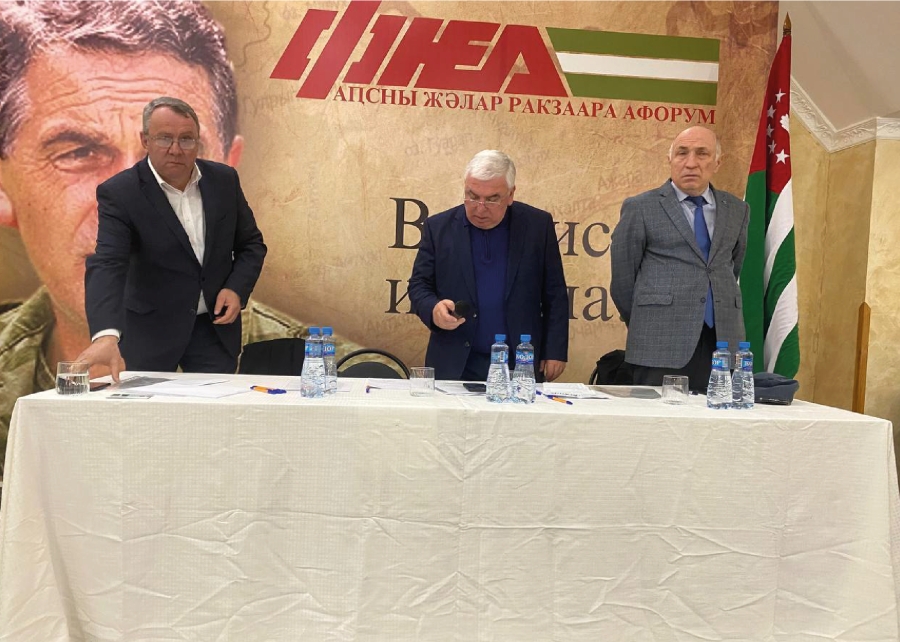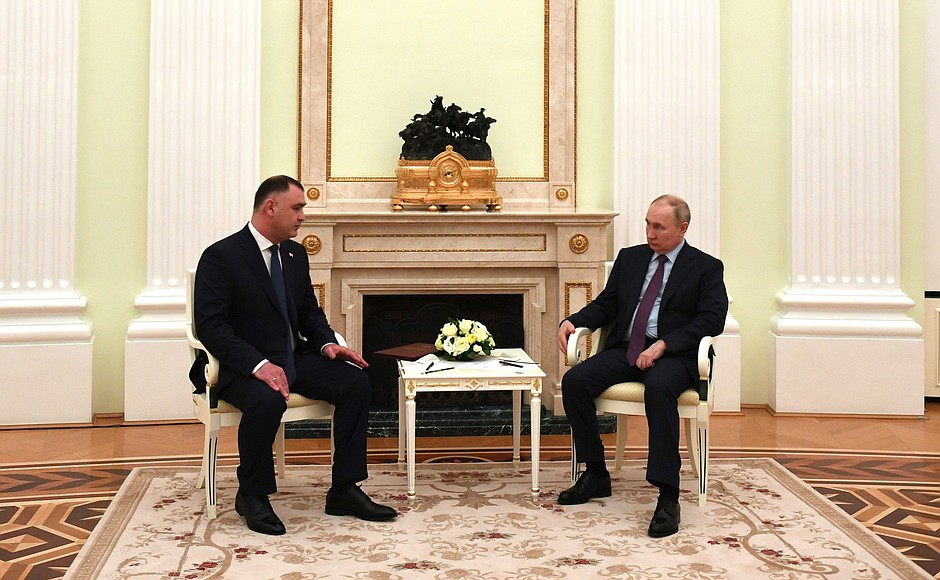-
Key Persons
-
Important Agreements
-
Chronology of Events
-
 Infographics
Infographics
-
Key Agencies
-
Chronology of Visits
-
 News
News
-
 Monthly Review
Monthly Review
Occupied Regions of Georgia: Review of Main Events and Trends

Publication: N6 / Review Period: March 1-31, 2023
The review is being prepared within the framework of the Roadmap to the Kremlin's Policy in Abkhazia and the Tskhinvali Region project. The purpose of the review is to provide readers with information about main events and trends in the occupied regions of Georgia. The review is a monthly publication and will be useful for decision-makers, public employees, media representatives and other people who are interested in the developments taking place in the occupied regions of Georgia.
New Concept of Russian Foreign Policy and the Occupied Regions
On March 31, the Russian President, Vladimir Putin, approved a new concept of foreign policy of the Russian Federation. Until now, the concept adopted in 2016 was in effect. The priority direction in the concept is the socio-economic development of ally countries, including the de facto republics of Abkhazia and the Tskhinvali region.
The development of relations with the occupied regions is separated from the regional directions of Russia's foreign policy. According to the document (Chapter V), Russia gives priority to “comprehensive support to the republics of Abkhazia and South Ossetia in the realization of the voluntary choice of the peoples of these countries based on international law, which envisages the deepening of integration with Russia.” It provides for greater integration of the Tskhinvali region and Abkhazia into Russia’s political, economic and legal space.
Reaction on Tbilisi Events
Events which took place in Tbilisi on March 7-9, following the adoption of a law on so-called “foreign agents” by the ruling political force, provoked a reaction both in Abkhazia and the Tskhinvali region.
Meeting with the Security Forces
On March 10, at a meeting with representatives of the security agency, the de facto President of Abkhazia, Aslan Bzhania, discussed internal and external threats. After the meeting, “due to the ongoing developments in neighboring Georgia,” representatives of the law enforcement agency were transferred to an enhanced mode of operation.
Military Exercises in Gali
On March 11-14, military exercises were held in the Gali district with the participation of representatives of de facto law enforcement agencies (State Security Service, Ministry of Internal Affairs, State Security Service). On March 13, Bzhania personally checked the progress of the exercise and visited a new engineering infrastructure at the occupation line.

Aslan Bzhania Checks the Progress of the Military Exercise
Evaluations
On March 9, the de facto Foreign Minister of Abkhazia, Inal Ardzinba, assessed the ongoing events in Tbilisi as another coup attempt in the post-Soviet space and accused the US State Department and the US Embassy in Tbilisi for supporting it. He also spoke about destructive role of the so-called NGOs in preparation of such events.
According to the assessment of the de facto Ministry of Foreign Affairs of the Tskhinvali region, a serious internal political crisis is developing in Georgia which may threaten the stability and security of the Caucasus; however, the “Ministry” reports that the situation at the occupation line is relatively calm. The so-called State Security Committee also made the same statement about the stable situation at the occupation line. On March 10, the Committee reported that the operational situation at the occupation line remains stable and there are no trends towards its escalation.
On March 9, during a telephone conversation, the de facto Foreign Affairs Ministers of the occupied regions discussed the Tbilisi events as well.
Abkhazia
Cooperation Between “Security Councils”
The Secretary of the Security Council of the de facto republic of Abkhazia, Sergey Shamba, met with the Secretary of the Security Council of Russia, Nikolai Patrushev. At the meeting, the parties signed a cooperation plan for 2023-2024 between the “Security Councils” offices. Similar agreements, as a rule, are formed periodically between the relevant “state agencies” of Russia and the occupied regions which determine the framework of cooperation in a specific field.

Signing of the Cooperation Plan
“Foreign Agency” Modernization
Changes are being implemented in the de facto Ministry of Foreign Affairs. On March 3, Inal Ardzinba met with the Abkhaz “Ambassador” to Russia, Alkhas Kvitsinia. The meeting discussed the issue of the “Embassy” optimization. Various measures were set as a result of inconsistencies identified by the Attestation Commission in the activities of the “Embassy” of Abkhazia to Russia: create a attestation commission to select diplomats; create a modern material-technical base, in particular purchase the necessary equipment for conducting a video conference; improve financial discipline; ensure the effective use of “Embassy” property; establish an electronic access system to record the presence/absence of employees at the workplace; introduce a staff unit of the “Security Attache” at the “Embassy.”
In March, the dismissal of an employee of the “Embassy” of Abkhazia in Russia, Tatiana Gulia, was especially noisy. Ardzinba released the granddaughter of the founder of Abkhaz literature, Dmitry Gulia, due to “non-compliance with her position based on a decision of the Attestation Commission.” She has been working in Moscow since 1992, and the latest position she held at the “Embassy” was the Press Attache. Gulia was most outraged by the “boorish form of the dismissal” by Ardzinba who “himself was dismissed from the Russian Presidential Administration and failed to pass the certification.” She accused Ardzinba of “systematic destruction and collapse of the embassy.” Later, Ardzinba responded to Gulia's criticism saying that “there were many problems, however, he doesn't want to talk about it publicly since it would be unethical.”
The ongoing changes in the de facto Foreign Ministry are part of Ardzinba's policy which is aimed at staffing the de facto Ministry and “Embassies” with young personnel who are loyal to him.
Diplomatic Activities
- On March 2, Ardziba announced new foreign policy initiatives following to Bzhania’s press conference:
- Establish a strategic mechanism of Sokhumi-Moscow-Minsk consultations;
- Minsk can become an alternative arena for the negotiation process on the security and stability in the South Caucasus;
- Create a new agency which will be responsible for the development and implementation of reforms.
- On March 7, the Abkhaz “Ambassador” to Syria, Bagrat Khutaba, met with the Syrian Minister of Foreign Affairs, Faisal Mekdad.
- In March, a delegation of the de facto Ministry of Foreign Affairs paid working visits to Afghanistan and Lebanon. The main goals of the visits were the development of trade and economic relations, the establishment of trading houses and the expansion of humanitarian ties with the countries of the Middle East. The meeting details are unknown.
- On March 21, the Embassy of Palestine in Nicaragua held a ceremonial event on the Day of Culture. The ceremony was attended by Inar Ladaria, the “Ambassador” of Abkhazia to Nicaragua.
- On March 24, Ardzinba participated in the Business Dialogue in the Eurasian Space international business forum which was held in India. During his online speech, Ardzinba spoke about the role of tourism in the economy.
- On March 24, an exhibition of Abkhazian products was organized in premises of the famous kitchen manufacturer SieMatic in Berlin. The event was organized by the so-called Chamber of Commerce and Industry of Abkhazia and its so-called representative in Germany, Wolfgang Matzke. The Consulate General of Russia in Leipzig also took part in the organizational process.
- On March 30, Ardzinba had a telephone conversation with the Deputy Minister of Foreign Affairs of Russia, Mikhail Bogdanov. Bogdanov is the Special Representative of the Russian President in the Middle East. For the de facto government the Middle East is a priority direction in terms of recognition policy.
Opposition Congress
On March 29, Sokhumi hosted a congress of the Forum of National Unity of Abkhazia opposition political party. The participants accused the de facto government of “lobbying the interests of foreign and aggressive oligarchs in the form of selling them the best land plots.” In this regard, the agreement on the transfer of the Bichvinta state country house to Russia became the subject of special criticism. In the final resolution, the attendees called on the de facto President to voluntarily resign from his post. The former de facto President, Raul Khajimba, and a former “presidential” candidate, Adgur Ardzinba, who is considered a prospective “presidential” candidate among opposition politicians, attended the Congress. Such gatherings are part of the struggle against the de facto government which is aimed at gaining an advantage in the internal political struggle.

Congress of the Forum of National Unity of Abkhazia
Tskhinvali Region
Alan Gagloyev's Meeting with Putin
On March 16, the de facto President of the Russian-occupied Tskhinvali region, Alan Gagloyev, met with the Russian President, Vladimir Putin. After being president-elected in 2022, this was Gagloyev’s first meeting with Putin. This meeting was planned in February, however, the day before, Gagloyev was diagnosed with Covid and the meeting was postponed. Gagloyev was often criticized by his opponents for taking so long to meet with the Russian leader. Although no new important decisions were made during the meeting, the delayed meeting with Putin is still a big relief for Gagloyev since it will give him a certain advantage in the internal political struggle in the de facto republic.

Alan Gagloyev's Meeting with Vladimir Putin
“Border Demarcation”
On March 2, the so-called commission on the “delimitation and demarcation of the state border of the Republic of South Ossetia with Georgia” completed its work and unilaterally prepared a draft “map-plan” of the Georgian-South Ossetian “state border” and the final report of the working group. According to participants, as a guide, the commission used the decree No. 2 adopted by the Councils of the Central Executive Committee of All Georgia and the Council of People's Commissars – “On the creation of the South Ossetian Autonomous District,” which was adopted in 1922. The mentioned documents were forwarded to the de facto President for further action. Determining the “border” may contribute to the renewal of the “borderization” process.
Jabiev's Case
According to the de facto Prosecutor's Office, the preliminary investigation into the criminal case on the death of Inal Jabiev is completed. Jabiev died on August 28, 2020, in the building of the criminal militia as a result of violence by representatives of the law enforcement agency. Several employees of the de facto Ministry of Internal Affairs have already been detained in the case. After all the participants are familiar with the criminal case, it will be sent to the “court.” Jabiev's case caused a serious political blow to Gagloyev's predecessor, Anatoly Bibilov, and contributed to his defeat in the “presidential” elections.
IPRM Meeting in the Village of Ergneti
On March 2, the 111th meeting of the Incident Prevention and Response Mechanism (IPRM) was held in the village of Ergneti. A representative of the Tskhinvali region also attended the meeting and spoke about the issue of the Georgian police checkpoint in the village of Chorchana and demanded its dismantle which is opposed by the Georgian side. It is interesting that he assessed the past period as “the most peaceful period.” The next meeting is scheduled on April 25.

